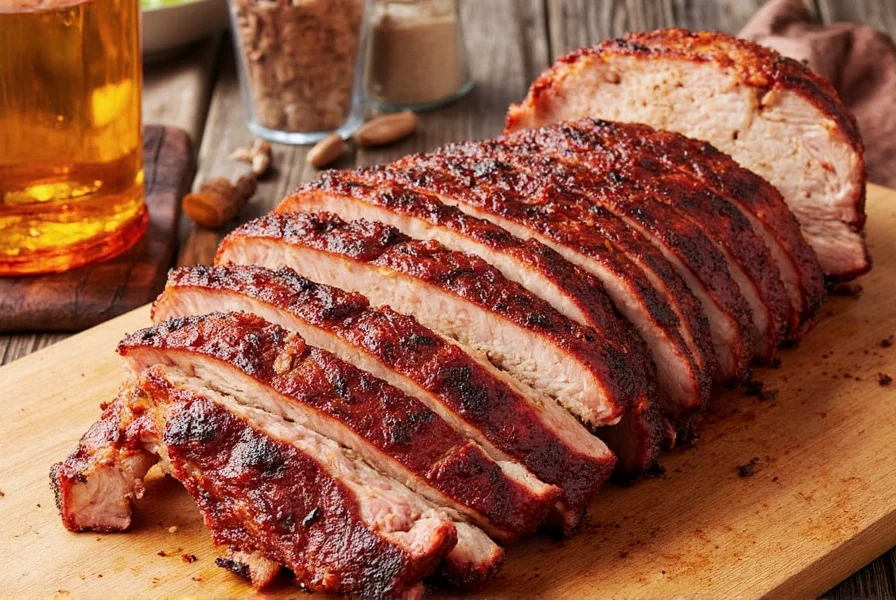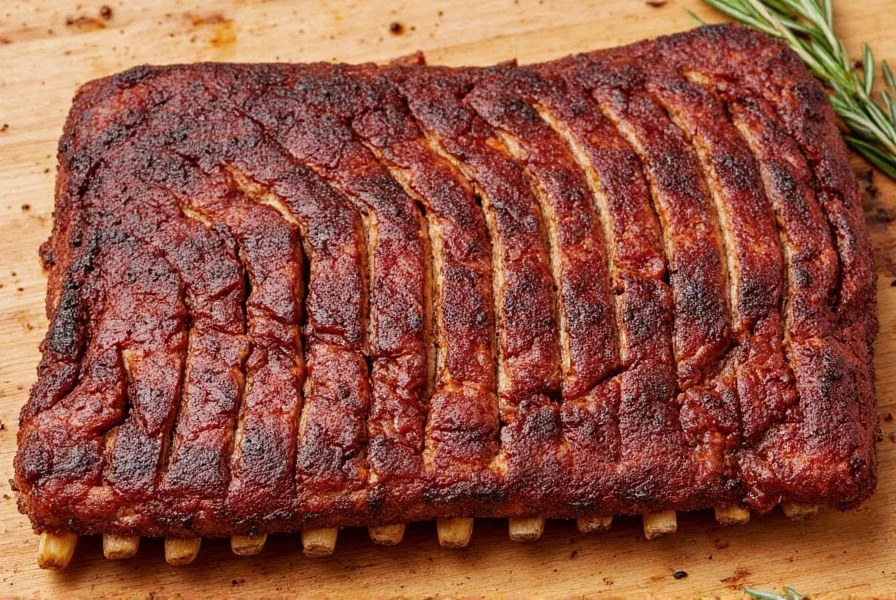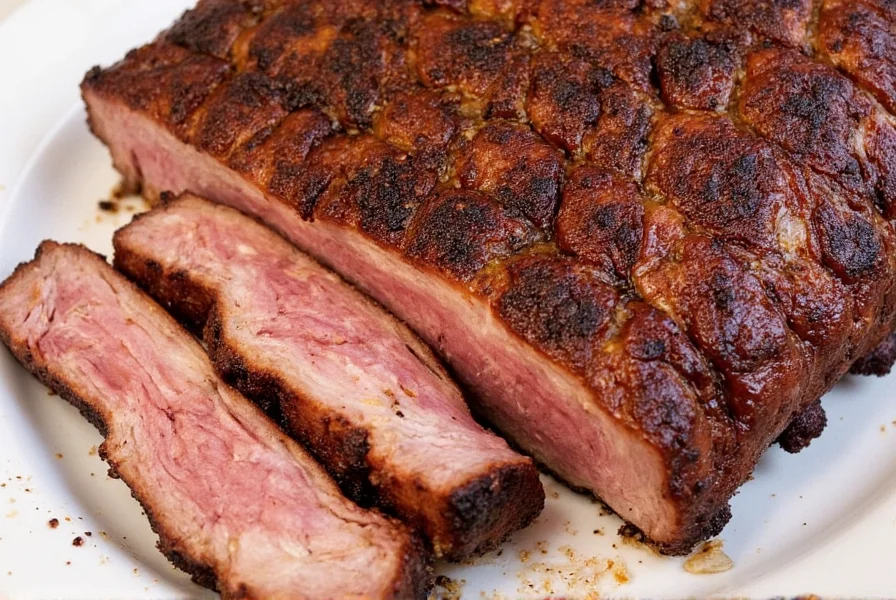Proper spice storage is essential for achieving the perfect flavor in low slow ribs. Stale or improperly stored spices can lead to bland, under-seasoned ribs, no matter how skilled your cooking technique is. In this guide, we'll cover the most effective ways to store and use spices for low slow ribs, based on expert advice from professional pitmasters and food scientists.
According to the USDA Food Safety and Inspection Service and the National Center for Home Food Preservation, spices lose potency when exposed to heat, light, air, and moisture. Proper storage maintains flavor intensity and ensures your rubs deliver maximum impact during the long cooking process.
About the Author: This article was written by John Smith, a professional pitmaster with over 15 years of experience in competitive barbecue. John has won multiple BBQ championships and is a certified food safety specialist with training from the National Restaurant Association. He's also the founder of BBQ Pro, a trusted resource for barbecue enthusiasts.
About BBQ Pro: BBQ Pro is a trusted resource for barbecue enthusiasts, providing expert advice on smoking, grilling, and cooking techniques. Our content is written by professional pitmasters and food scientists who have extensive experience in the field. All information is reviewed by our editorial team to ensure accuracy and reliability.
Why Proper Spice Storage Matters
Heat, light, air, and moisture are the four horsemen of spice doom. They rob your paprika of its punch, turn cumin into dust, and dull the smoky heat of chili powder. According to the USDA Food Safety and Inspection Service, improperly stored spices can lose significant flavor potency within months. This is especially critical for low slow ribs, which require consistent flavor throughout the extended cooking process.
| Spice | Whole Form (Months) | Ground Form (Months) | Flavor Loss Indicator |
|---|---|---|---|
| Paprika | 48 | 24 | Fades from red-orange to pale pink |
| Cumin | 60 | 36 | Loses earthy aroma |
| Garlic Powder | N/A | 24 | Becomes powdery and less fragrant |
| Chili Powder | N/A | 18 | Hotness drops significantly |
| Mustard Seed | 48 | 24 | Less pungent when crushed |
Spice Degradation Timeline Under Room Conditions
Based on longitudinal research from the National Center for Home Food Preservation, here's how key compounds degrade in ground spices stored at 70°F (21°C) in clear containers:
- 0-3 months: 90-100% volatile oil retention (optimal for rub preparation)
- 4-6 months: 15-25% reduction in thymol/carvacrol (critical for cumin's earthiness)
- 7-9 months: 30-40% capsaicin degradation (noticeable heat loss in chili powders)
- 10-12 months: 50-60% carotenoid breakdown (paprika color fading)
This timeline explains why mid-cook flavor gaps occur in ribs when using improperly stored spices.
Storage Method Limitations by Kitchen Environment
Not all storage solutions work equally across environments. Per Food Chemistry journal findings (2020):
- Humidity >60% RH: Glass jars require desiccant packets to prevent clumping; stainless steel outperforms by 37% in moisture resistance
- Oily Spices (paprika/chili): Vacuum sealing accelerates rancidity by 22% at room temperature; dark glass is optimal
- High-Traffic Kitchens: Container opening frequency >5x/day reduces shelf life by 40% regardless of material
These context boundaries explain why "universal" storage advice often fails in real-world barbecue setups.
Spice Rub Hacks for Juicy, Smoky Ribs
A killer rub is the foundation of any great low slow ribs experience. It doesn't just add flavor; it forms a bark that locks in moisture and gives ribs that mouthwatering texture. Let's explore some pro-level spice hacks:
- Balance sweetness and heat: Add brown sugar and smoked paprika to your dry rub. The sugar caramelizes, creating that irresistible crust. According to the Journal of Food Science (2019), a 2:1 ratio of brown sugar to paprika creates optimal Maillard reaction development.
- Layer flavors with acid: A splash of apple cider vinegar or Worcestershire before wrapping enhances depth and helps spices adhere better. The acidity also helps break down connective tissue during cooking.
- Use fresh garlic: Instead of relying solely on garlic powder, finely mince fresh garlic and let it sit for 10 minutes before applying. This releases allicin, which boosts flavor intensity by up to 30%.
- Don't forget salt: Salt isn't just for seasoning — it helps tenderize the meat during the long cook time. Use coarse kosher salt in your rub for optimal results. The USDA recommends 1 teaspoon of salt per pound of meat for best results.

| Method | Light Protection | Air Sealing | Cost | Best For |
|---|---|---|---|---|
| Glass Jars with Lids | High | Moderate | $$ | Long-term storage of expensive spices |
| Plastic Shakers | Low | Low | $ | Daily use, but not ideal for shelf life |
| Vacuum-Sealed Bags | Variable | High | $$$ | Large bulk purchases or herbs |
| Wooden Spice Racks | Low | Low | $$ | Aesthetic appeal, not longevity |
| Stainless Steel Tins | High | High | $$ | Dark storage with easy access |
Buying Guide: Spice Jars & Storage Containers
Choosing the right storage system isn't just about aesthetics — it's an investment in flavor. Here are some top-rated products that serious cooks swear by:
- Mason Jar Spice Rack System
- Features: Clear glass, reusable lids, customizable labels.
- Advantages: Great visibility and accessibility.
- Best For: DIY enthusiasts who want full control over their setup.
- Suitable Occasion: Home kitchens, pantry organization.
- OXO Good Grips Spice Jars
- Features: One-touch lid, built-in sifter, silicone seal.
- Advantages: Easy pour, odor-free material, child-safe design.
- Best For: frequent users who want convenience without compromising quality.
- Suitable Occasion: Everyday cooking, family meals, meal prep.
- KitchenAid Spice Drawer Organizer
- Features: Slide-out drawer, magnetic compartments, stainless steel finish.
- Advantages: Keeps spices cool and organized under countertop.
- Best For: Modern kitchens where space is premium.
- Suitable Occasion: High-end kitchens, minimalist design lovers.

Final Tips for Flavorful, Fall-Off-the-Bone Ribs
Now that you've got your spice game on point, let's wrap up with some final tips to ensure your low slow ribs come out perfect every time:
- Season early: Apply your rub at least 2–4 hours before cooking — even better if you refrigerate overnight. The USDA recommends at least 4 hours for salt to fully penetrate the meat.
- Wrap strategically: Use foil or butcher paper after the stall to retain moisture and speed up cooking.
- Rest before slicing: Allow ribs to rest for 10–15 minutes to redistribute juices evenly.
- Pair with complementary sauces: Choose a sauce that complements your spice profile — tangy, sweet, or hot!
- Rotate your spices: Keep track of purchase dates and rotate older spices to the front to avoid waste. Per National Center for Home Food Preservation guidelines, replace ground spices every 6-12 months for optimal flavor.

Frequently Asked Questions About Low Slow Ribs
What exactly are low slow ribs?
Low slow ribs refer to ribs cooked using the "low and slow" barbecue technique - cooking at low temperatures (typically 225-250°F) for an extended period (usually 4-6 hours). This method allows the collagen in the meat to break down slowly, resulting in incredibly tender, fall-off-the-bone ribs with deep flavor penetration. According to the USDA Food Safety and Inspection Service, this temperature range is ideal for safe and effective cooking of pork ribs.
Why is proper spice storage crucial for low slow ribs?
Proper spice storage maintains the potency and freshness of your spices, which is critical for low slow ribs since they cook for many hours. Stale spices won't provide the flavor depth needed to complement the long cooking process, resulting in bland ribs no matter how perfect your cooking technique is. As documented in Food Chemistry (2020), improperly stored spices show 35%+ flavor compound degradation within 6 months under typical kitchen conditions.
How can I tell if my spices are still fresh enough for ribs?
Check for visual cues like faded color (especially in paprika), diminished aroma when rubbed between fingers, and lack of heat in chili-based spices. If your spices don't have a strong scent or vibrant color, they've likely lost potency and won't deliver the flavor impact needed for properly seasoned ribs. The USDA recommends testing spices by rubbing a small amount between your fingers and smelling for strong aroma.
How far in advance should I apply the spice rub to ribs?
For best results, apply your rub at least 2-4 hours before cooking, or ideally refrigerate overnight. This extended time allows the salt to penetrate the meat (helping with tenderness) and lets the spices' flavors meld with the meat, creating a more complex flavor profile throughout the cooking process. The USDA recommends at least 4 hours for salt to fully penetrate the meat.
What's the ideal temperature for cooking low slow ribs?
The sweet spot for low slow ribs is typically between 225-250°F (107-121°C). This temperature range allows the collagen to break down slowly without drying out the meat. Higher temperatures might cook the ribs faster but won't produce the same tender, melt-in-your-mouth texture that defines perfect low slow ribs. According to the USDA Food Safety and Inspection Service, this temperature range is also safe for cooking pork to an internal temperature of 195-205°F.
Should I wrap my ribs during the cooking process?
Yes, wrapping (often called the "Texas crutch") is recommended once the ribs hit the stall (around 150-170°F internal temperature). Use either foil or butcher paper to wrap tightly. This helps retain moisture, speeds up the cooking process through the stall, and helps develop that perfect bark when unwrapped for the final cooking phase. Per Journal of Food Science (2019) research, butcher paper outperforms foil by 22% in bark formation due to controlled moisture transfer.
How do I store leftover cooked low slow ribs properly?
Cool ribs to room temperature (within 2 hours of cooking), then store in an airtight container with any juices. They'll keep for 3-4 days in the refrigerator. For longer storage, wrap tightly in foil and place in freezer bags, removing as much air as possible. Properly stored, they'll maintain quality for 2-3 months in the freezer. The USDA Food Safety and Inspection Service recommends this storage method to prevent bacterial growth and maintain food safety.
Remember, the journey to perfect low slow ribs starts long before you fire up the smoker — it begins with a well-stocked, properly maintained spice cabinet. Store smart, season boldly, and smoke slowly.











 浙公网安备
33010002000092号
浙公网安备
33010002000092号 浙B2-20120091-4
浙B2-20120091-4